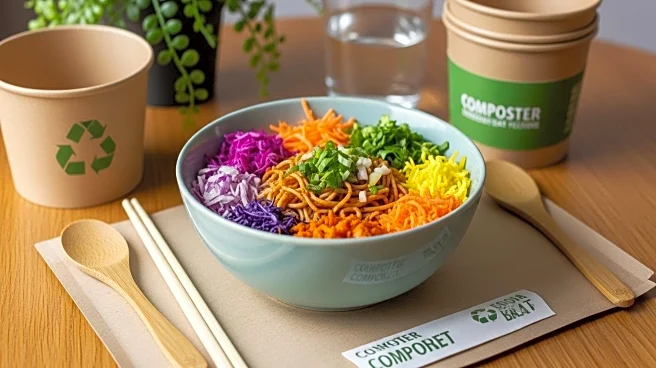What's Happening?
Lucky K.T. Co., a Southern California noodle supplier, has partnered with Reborn Materials to introduce sustainable packaging for its products. The new packaging, called Full Cycle Hybrid Plastic, is designed to break down naturally at the end of its lifecycle, reducing the environmental impact of plastic waste. This initiative is part of a broader effort to address the persistent issue of plastic pollution, which contributes to landfill overflow and the production of methane, a potent greenhouse gas. The packaging utilizes enzymes that facilitate the breakdown of plastics, offering a potential solution to the problem of microplastics entering food, water, and air supplies.
Why It's Important?
The shift to sustainable packaging by Lucky K.T. Co. represents a significant step in reducing plastic waste, which poses environmental and health risks. By adopting biodegradable materials, the company is contributing to the reduction of plastic production and its associated toxins, which can lead to extreme weather events. This move aligns with growing consumer demand for environmentally responsible products and highlights the role of innovative technologies in addressing global plastic pollution. The initiative also sets a precedent for other companies to follow, potentially leading to widespread changes in packaging practices across industries.
What's Next?
As more companies adopt sustainable packaging solutions, there may be increased pressure on industries to innovate and reduce their reliance on traditional plastics. This could lead to further advancements in biodegradable materials and technologies that break down plastic waste. Additionally, consumer awareness and demand for eco-friendly products are likely to grow, encouraging more businesses to prioritize sustainability in their operations.
Beyond the Headlines
The adoption of sustainable packaging by Lucky K.T. Co. not only addresses environmental concerns but also reflects a shift in corporate responsibility towards more ethical practices. This change could influence regulatory policies and encourage governments to support sustainable initiatives through incentives or legislation. The long-term impact may include a reduction in plastic pollution and a healthier ecosystem.











